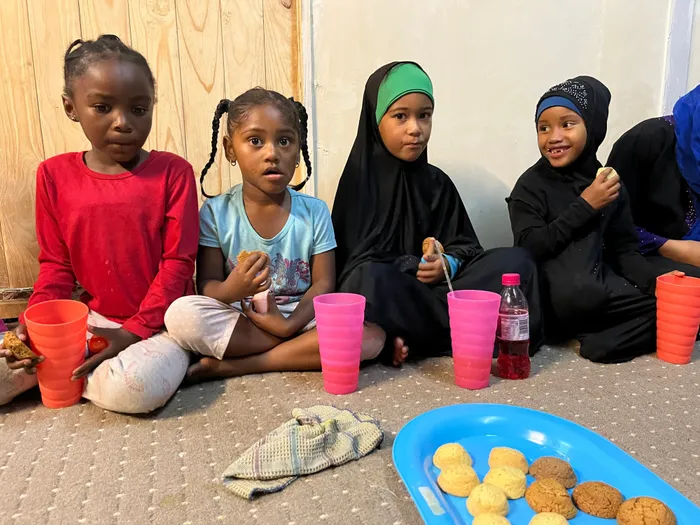’Plain’s hunger pains

Kelsey Esau, Ruqiyya Johaar, Na-eelah Galant and Zahrah du Toit enjoy boeka.
As winter approaches many Mitchell’s Plain residents worry where their next meal will come from.
These were the sentiments shared by people standing in queues at soup kitchens.
The Plainsman accompanied South African National Zakaah Fund (SANZAF) and Tafelsig Council Islamic Scholars’ volunteers as they delivered food to a few households in Tafelsig on Thursday April 6.
Maulana Ganief Francis, from the council, said there was a great need to help feed the unemployed, grandparents raising their grandchildren and single parents who work and try to raise their children.
He said it was difficult to keep up with the demand because they were only able to feed on certain days based on donations.
“We often cook from our pockets but this is not sustainable and we also have to be careful because people will spend their money on drugs and they will stand in the line for food,” he said.
Maulana Francis said they have had to stop street boekas (breaking of fast in the evenings) because there was no control.
“It was a free for all and the intention from the donors to feed the fasting person was not met,” he said.
He said collaboration was key in ensuring more people were fed.

Recipient grandfather Rashaad Swain, 68, from Tafelsig, said they appreciate the food because he and his wife were pensioners raising their foster grandchildren.
A few doors away donor Sual Saal, who distributes bread weekly to her neighbours, said recipients looked forward to a loaf.
“There is a lot of poverty here. People don’t work and there are lots of children in need. We as neighbours are pretty understanding. We help each other,” she said.
Ms Saal said they do their best to support each other but donations were not always available.
SANZAF spokesperson Sakeena Bock said they needed to reach out to donors to meet their target of feeding a million South Africans this Ramadaan, the month of fasting for Muslims.
She said they fed on average 40 000 people in Mitchell’s Plain and its surrounds daily.
Ms Bock said as soon as Ramadaan ends they would start their Operation Winter Warmth campaign, a national initiative aimed as easing the situation for the less fortunate.
Wolfgat Sub-council chairman and councillor for Ward 116, Solomon Philander, said outside of the national Covid-19 lockdown, there were no humanitarian support programmes for Mitchell’s Plain residents.
He said the City of Cape Town had partners, non-government organisations (NGOs), who would be called upon to render services in the event of disasters.
“There are grants available for which organisations can apply for but they must be registered and they must meet the criteria for the respective funds,” he said.

Anthea Arendse, principal of Mizpah Educare Centre, based in Beacon Valley, said Mitchell’s Plain had a lack of everything.
She noticed the need first-hand during the Covid-19 pandemic when the centre received funds from the government, which they was used to aid and supply 35 soup kitchens in Mitchell’s Plain, split over three wards, including Eastridge, Beacon Valley, Morgenster, Portland, Rocklands and Westridge between 2020 and October 2021 (“City funds feed hundreds daily”, Plainsman July 7 2021).
"The supplying of food to the communities within Mitchell’s Plain was a great help.
“Many people were not compliant but they had good hearts and many of them fed from their pockets,” she said.
Ms Arendse said before government funding, family, friends and members of her prayer circle, up to 100 people, gave R100 per week which they used to start their feeding.
“This was early in 2020 and we were able to feed queues of people,” she said.
Mizpah’s focus was to feed their pupils because often it was where they ate their first and last meal of the day. They also received funding from the Western Cape department of social development which had them deliver food at pupils’ homes.
“Poverty is a real issue. Unemployment is a real issue and it makes it challenging for families,” she said.
“Load shedding has also extended the poverty queue with parents working less hours resulting in less pay,” she said.
Ms Arendse said during the pandemic contacts were made, relationships built and the goal was clear - to feed people.
She said if the one kitchen did not have enough they could ask another kitchen, who perhaps received private funding.
They had served more than 40 millions meals, including breakfast and lunch or supper, on different days and at different kitchens with the funding.
Since October 2021, Ms Arendse has returned to personal donations to continue feeding at her Beacon Valley centre.
Now she manages with donations and reduced feeding to twice a week for up to 300 people.
Ms Arendse said there were many deaths during Covid-19 but the positive spin off was people were working together to keep the community fed and it built relations.
She had up to 20 volunteers who did not want money but wanted food.

They were trained in packing food, Covid-19 regulations and what was needed to be self-sufficient.
“Many of our members are not as active as they were during the pandemic because some of them have returned to work but we still have a need to feed children at least after school,” she said.
They cook on alternate days when they can, when there are volunteers and ingredients.
"During Covid-19 there was a great demand. There was funding. Now there is less pressure but there is still a need and we cook completely from our own pockets,“ she said.